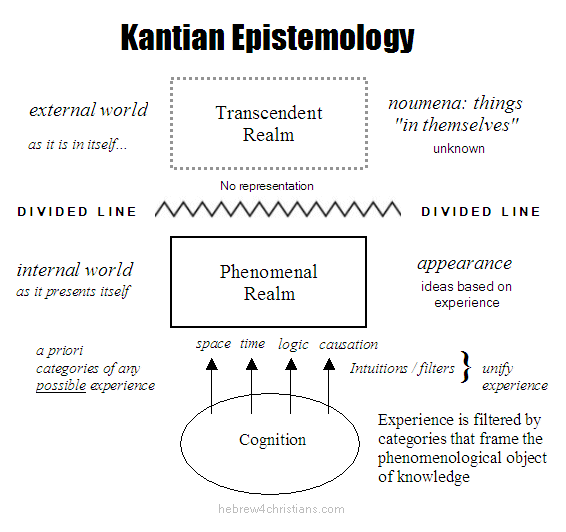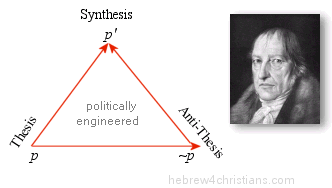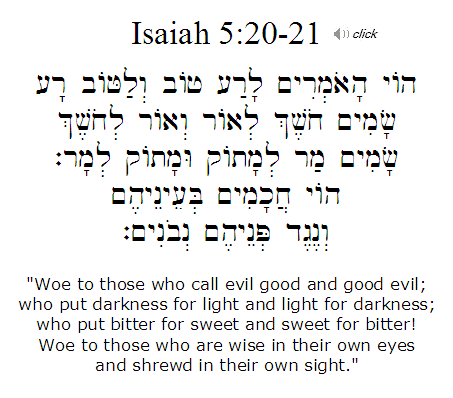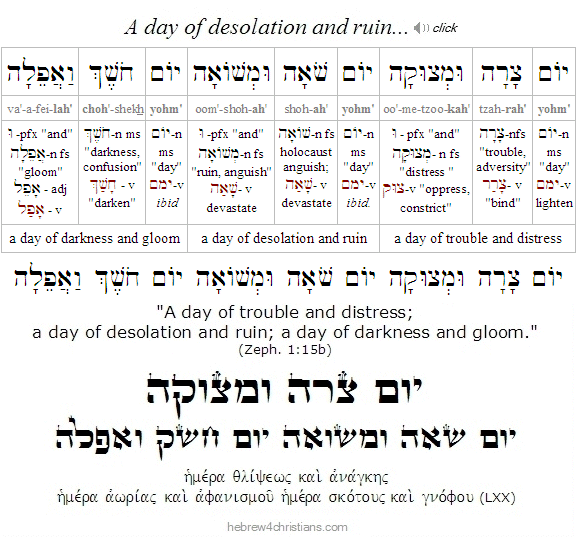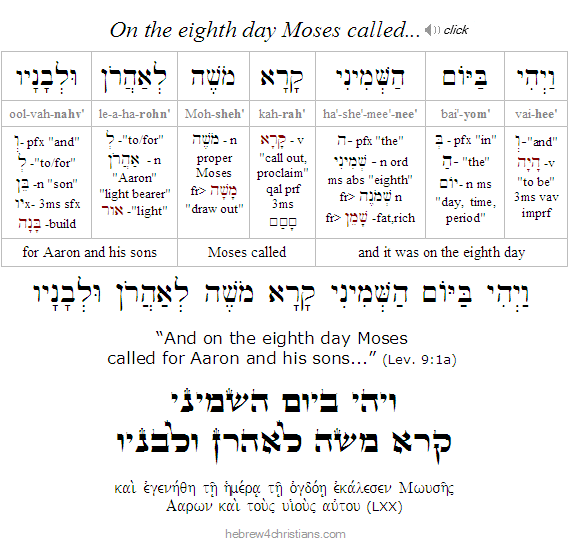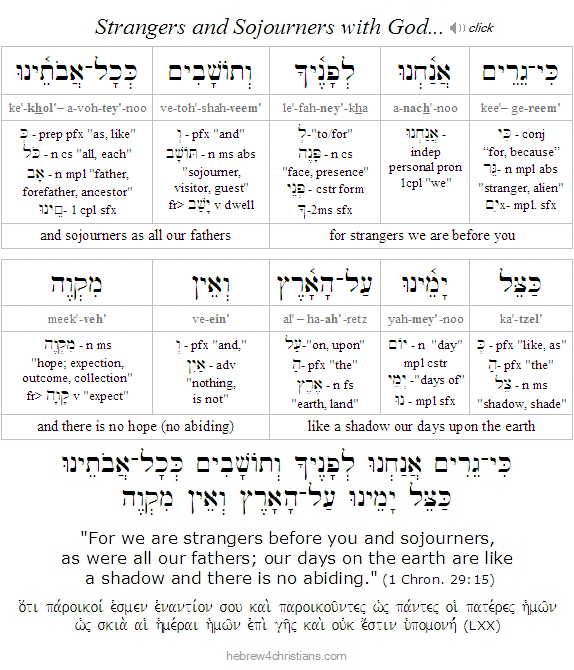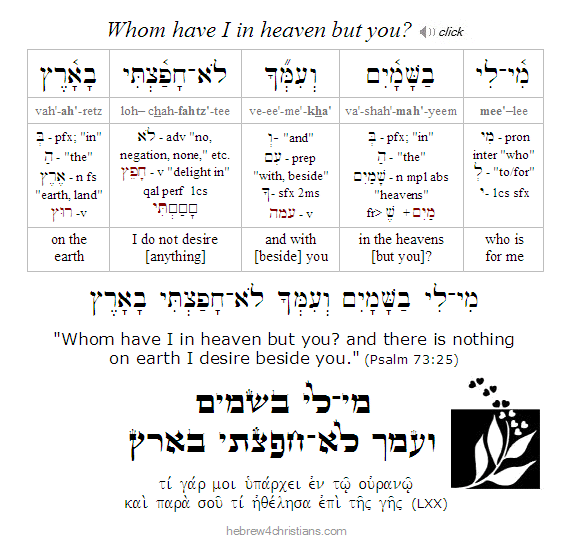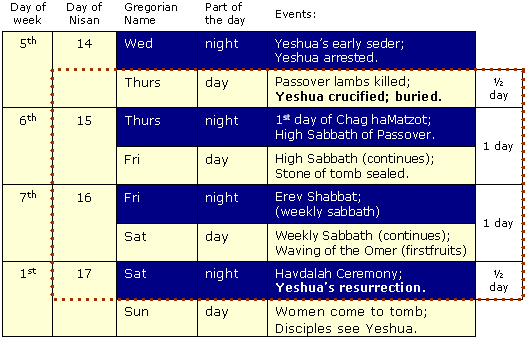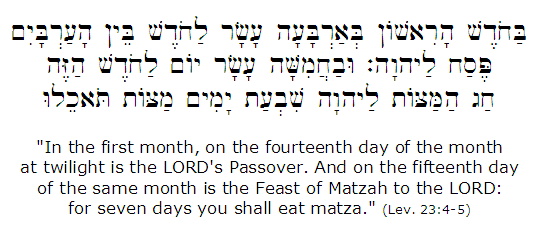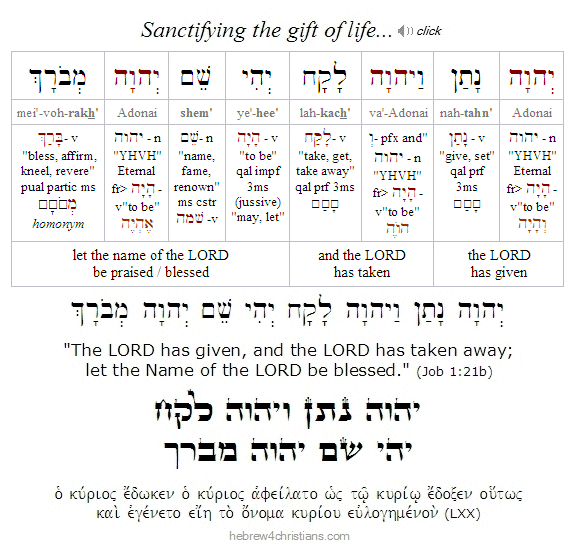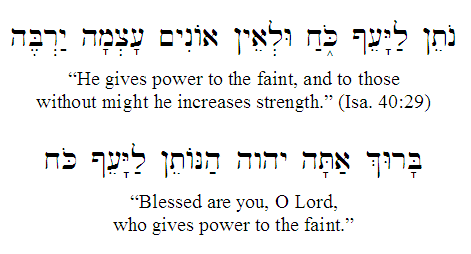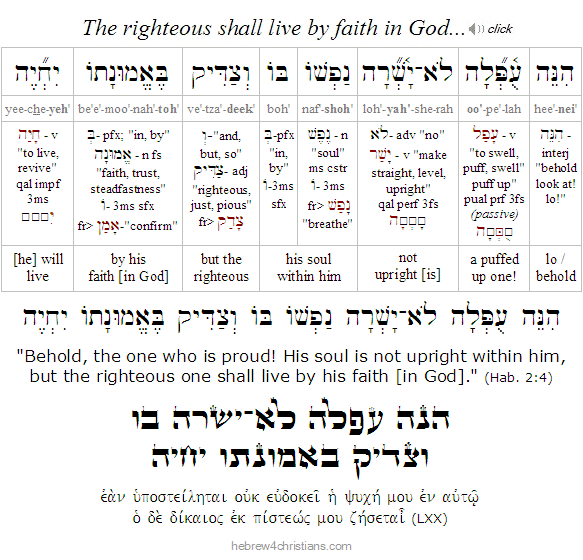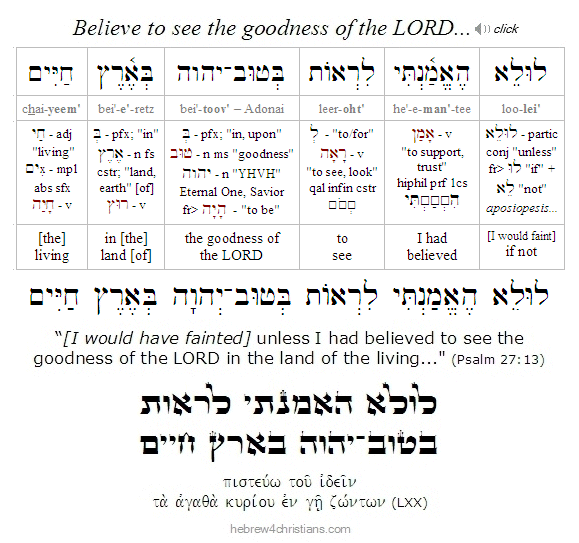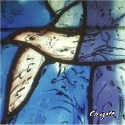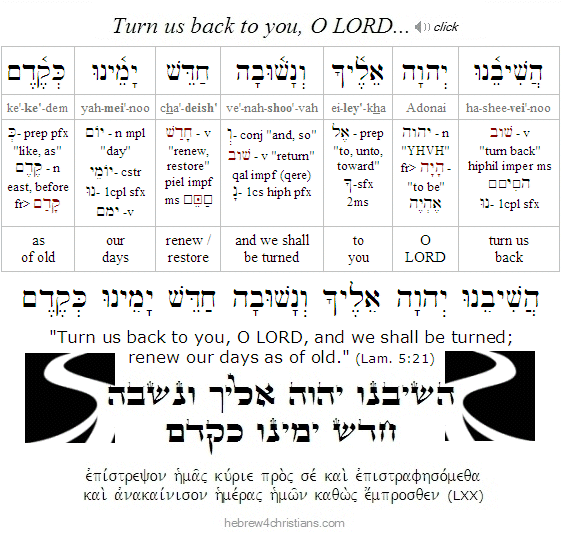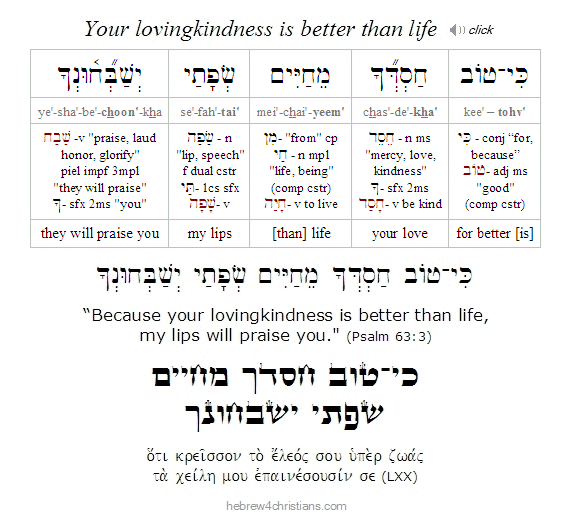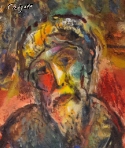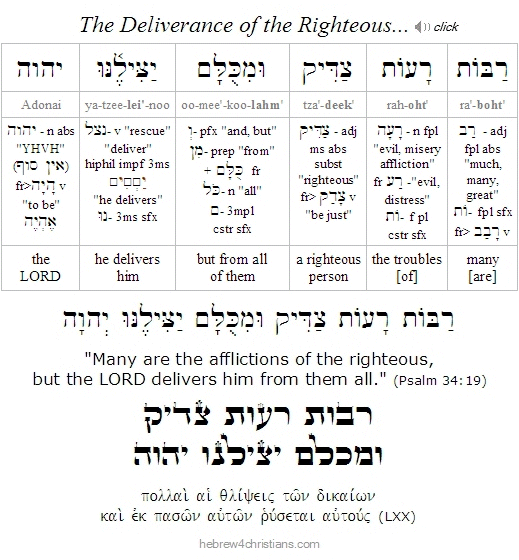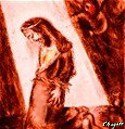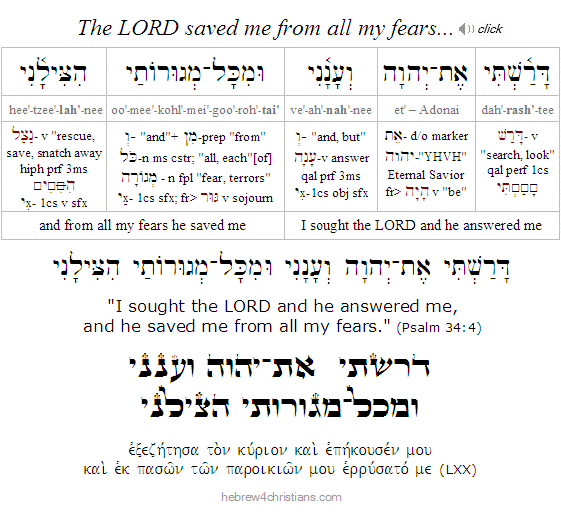|
|
|||||||||||||||||||||
 |
|||||||||||||||||||||
|
Learn Hebrew |
|||||||||||||||||||||
 |
|||||||||||||||||||||
|
Learn Torah |
|||||||||||||||||||||
|
April 2021 Updates (continued)
[ The Holocaust did not happen in a vacuum but was theoretically justified by appeals to pragmatism and the denial of transcendental spiritual reality... ]
Instead of accepting the limits of the human mind that Kant outlined (the "antinomies of reason"), however, G.W. Hegel (1770-1831) went on to claim that the mind itself is its own endpoint, and therefore the interplay of ideas is itself ultimate reality. In other words, Hegel was an "idealist," by which is meant that ideas (mental constructs) are the substrata of reality. The phenomenal realm is the product of the mind, after all, and therefore it is the very thing Kant said could not be known — i.e., the noumenal.
The Hegelian Dialectic is what I call "the devil's logic," based as it is on compromise, calling evil good and good evil, hissing out a seductive appeal to a supposed "higher synethesis" of esoteric knowledge, claiming superiority to the commonsense truth claims of experience, justifying human atrocities, barbarity, callous pragmatism, and even cold-blooded murder for the sake of power and control. From Hegel sprang Karl Marx (1818-1883) and Friedrich Nietzsche (1844-1900), and from Nietzsche sprang Hitler and modern fascism. Propagandists and disinformation specialists are masters at the "Problem → Reaction → Solution" technique for coercing social change. It's the prevailing dogma of the princes of this world, and it is regularly at work in the halls of power today.
"I live in the Managerial Age, in a world of "Admin." The greatest evil is not now done in those sordid "dens of crime" that Dickens loved to paint. It is not done even in concentration camps and labour camps. In those we see its final result. But it is conceived and ordered (moved, seconded, carried, and minuted) in clean, carpeted, warmed and well-lighted offices, by quiet men with white collars and cut fingernails and smooth-shaven cheeks who do not need to raise their voices. Hence, naturally enough, my symbol for Hell is something like the bureaucracy of a police state or the office of a thoroughly nasty business concern" (C.S. Lewis: Screwtape Letters, 1942). Related Topics:
Wed. April 7th, 2021 at sundown Holocaust Remembrance Day... 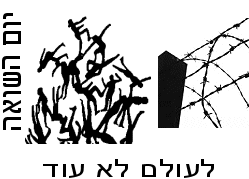 04.05.21 (Nisan 23, 5781) Yom HaShoah, or "Holocaust Remembrance Day," marks Israel's time of commemoration for the approximately six million Jews -- including over a million children -- who perished as a result of the actions carried out by Nazi Germany and its accomplices. It was inaugurated in 1953 and is annually observed on (or about) the 27th day of the month of Nisan, just a few days after Passover Week in the spring. In stark contrast to the celebration of freedom commemorated during Passover, Yom HaShoah marks a very difficult time when we revisit specters of absolute evil and again ask haunting questions about the power and presence of malevolence in our world. Often we are left speechless over the cruelty and depravity of human beings. It all seems so inexplicable, so needlessly horrible, so senseless, so vile... We may feel powerless, despondent, or full of indignation, but still we ask ourselves, how could this have happened? How was all of this possible?
This week's Torah: Parashat Shemini - פרשת שמיני  04.04.21 (Nisan 22, 5781) Happy holidays, chaverim! This week's Torah reading (following Passover) is called parashat Shemini ("eighth"), which continues the account of the seven-day ordination ceremony for the priests (as described earlier in Parashat Tzav). During each of these "seven days of consecration" Moses served as the first High Priest of Israel by offering sacrifices and training Aaron and his sons (i.e., the kohanim or priests) regarding their duties at the mishkan (i.e., "Tabernacle"). On the eighth day however, (i.e., Nisan 1), and just before the anniversary of the Passover, Aaron and his sons began their official responsibilities as Israel's priests. In the midst of the dedication, however, tragedy struck as Aaron's sons Nadav and Abihu took it upon themselves to make their own offering before the Holy of Holies of the tent. Since this was not the prescribed means of offering sacrifice, God considered the incense offered to be "strange fire" (i.e., esh zarah: אשׁ זרה) and both sons were tragically consumed by fire before the LORD (Heb. 10:29,31). Aaron was required to remain silent as his sons' bodies were removed by his cousins, and Moses then warned Aaron's two remaining sons, Eleazar and Ithamar, not to mourn during this sacred occasion.
Ephemera and Substance (גם זה יעבור) 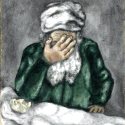 04.02.21 (Nisan 20, 5781) When Abraham sought a place to bury his wife Sarah, he said to the Hittites chieftains: "I am a stranger and sojourner among you..." (Gen. 23:4). The righteous invariably feel like strangers to this world, since they are only passing through, and their focus is on the invisible "city that has foundations, whose designer and builder is God" (Heb. 11:10). Likewise they are as sojourners, not at home in this world, because their faith sees through the vanity and deceit of the present world, and therefore they regard themselves as on a journey to the place of truth and holiness where God abides. The wicked, on the other hand, regard life in this world as all that exists, and therefore they "absolutize" the moment and forfeit the blessing of the eternal (Matt. 16:26). Abraham regarded himself as a "stranger and sojourner" (גֵּר־וְתוֹשָׁב) because the people of his world considered themselves as "owners" and "permanent residents" who sought their inheritance in the here and now. Abraham was a "resident" of someplace higher, however, and understood this world to be a corridor to the next. The sages comment on this paradox: God says to man, 'If you see yourself as a permanent resident in this world, then I will be a stranger to you; if, however, you see yourself as a stranger to this world, then I will be a Dwelling Place for you."
"The sense that in this universe we are treated as strangers, the longing to be acknowledged, to meet with some response, to bridge some chasm that yawns between us and reality, is part of our inconsolable secret. And surely, from this point of view, the promise of glory, in the sense described, becomes highly relevant to our deep desire. For glory means good report with God, acceptance by God, response, acknowledgment, and welcome into the heart of things. The door on which we have been knocking all our lives will open at last." (C.S. Lewis: Weight of Glory, 1942).
"Now, if we are made for heaven, the desire for our proper place will be already in us, but not yet attached to the true object, and will even appear as the rival of that object […] If a transtemporal, transfinite good is our real destiny, then any other good on which our desire fixes must be in some degree fallacious, must bear at best only a symbolical relation to what will truly satisfy" (C.S. Lewis: Weight of Glory, 1942).
Is "Good Friday" Biblical? 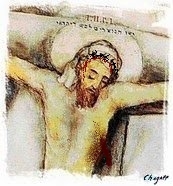 04.02.21 (Nisan 20, 5781) Recall that Yeshua said he would be "three days and three nights" in the earth after his crucifixion and then resurrected (see Matt. 12:40). There is no way, however to sum three days and three nights from Friday afternoon to Sunday before sundown... Therefore Yeshua was not crucified on a Friday. Instead Yeshua was crucified and buried Thursday afternoon on Nisan 14, before the Passover high sabbath began; He was in the tomb throughout Nisan 15 (Thursday night and Friday day) as well as Nisan 16 (Friday night and Saturday day), and then He was resurrected Nisan 17 (Saturday night). The women arrived to see the stone removed before sunrise on Sunday (Matt. 28:1). Note that the Greek text of the New Testament says that women came to the tomb at the end of the "Sabbaths" (σαββάτων), indicating both the Sabbath of the Passover as well as the weekly Sabbath.
According to this reckoning, Yeshua was crucified on Nisan 14 (a Thursday), exactly when the Passover Lambs were being offered at the Temple, and He rose from the dead three days and nights later, on the night of Nisan 17 (i.e., before sunrise on Sunday):
Note: I want to add something here just in case anyone were to assume that I am questioning the truth of the resurrection of Yeshua, God forbid! No, I am eternally grateful to God for the crucifixion and resurrection of the Lord: Yeshua is risen! Amen! He is the first fruits of all who have died (1 Cor. 15:20). That said, I believe it is our duty to study the Hebrew and Greek in order to accurately translate and interpret the Scriptures, and doing so indicates that church tradition is wrong regarding the matter of "Good Friday." I wrote this entry simply because I often hear pastors dogmatically proclaiming that Jesus died on "Good Friday" and was raised on "Easter Sunday," etc., with no contextual exegesis regarding Pesach, Bikkurim, Matzot, etc. and how Yeshua fulfilled the significance of these holidays perfectly.... Those connections are simply lost in historical church teaching about this subject...
Sufficient unto the day...  04.02.21 (Nisan 20, 5781) Who among us has not experienced loss? While we cannot escape suffering in this life, God can give us heart to face the struggle... "You shall love the LORD thy God will all thy heart – particularly while you are in the midst of bewilderment, testing, and affliction. As the prophet Job exclaimed in the midst of his losses, "The LORD gave and the LORD has taken away; may the Name of the LORD be blessed." יְהוָה נָתַן וַיהוָה לָקָח Adonai · na·tahn · vadonai · la·kach "The LORD gave and the LORD has taken away;
The Passover Lamb (שֵׂה הַפֶּסַח) 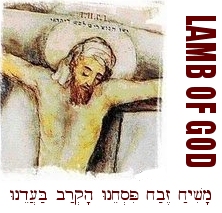 04.02.21 (Nisan 20, 5781) Some of the classical sages have said that the Passover was meant to be a prelude to the revelation given at Sinai, though it really had to do with the deliverance (i.e., yeshuah: יְשׁוּעָה) of those who had faith in God's remedy given through the blood of the lamb. The Passover anticipates God's victory over the powers of darkness -- recall that the final plague was delivered at midnight -- and the people then left Egypt for the promised land the following day -- a vivid testimony of God's power of redemption (Exod. 12:29; Exod. 12:41). We observe the Passover seder in the evening before the Exodus event because we share in the experience of salvation - trusting in God's deliverance from death by the agency of the sacrificial lamb - before we celebrate our freedom. Likewise we first go to the cross of Messiah, the Great "Lamb of God" - receiving God's provision for our healing and deliverance - before we begin our journey into the promise of newness of life (1 Cor. 5:7).
04.01.21 (Nisan 19, 5781) "I would have fainted unless I had believed to see the goodness of the LORD..." (Psalm 27:13). Faith is therefore self-authenticating: as you trust in the good, the good will be revealed: believe to see! As Yeshua said, "According to your faith be it done unto you" (Matt. 9:29). And if it is faith that makes you whole, then its lack makes you sick... As you doubt, so you will lose sight of what is real, true, and abiding. Being cynical is cowardly: "There are two ways to be fooled. One is to believe what isn't true; the other is to refuse to believe what is true" (Kierkegaard). The cynic refuses the possibility of truth because he is afraid of being fooled, and for this fear he willingly closes his eyes to the good. "Believe that life is worth living, and your belief will help create the fact" (James). When we trust God's promises, we affirm an unseen good even if the present hour is shrouded in darkness. Faith sees beyond "the seen" to the unseen (2 Cor. 4:18). The "seen" is not ultimately real, and consequently faith is exiled from the vanity of the present hour (עולם השקר ). Therefore affirm your faith, dear friend; do not allow your heart to waver. Refuse the darkness of fear by choosing to believe in the reality of God's love for your soul, despite the mess you've made of your life. Affirm that God's love is more real, more substantive, and more valuable than anything disclosed in this world that fades away. Amen.
04.01.21 (Nisan 19, 5781) Theology teaches that God is "omnipresent," or always present everywhere (בְּכָּל מָקוֹם), though much of the time we seem disconnected and lose touch with spiritual Reality. After all, it's one thing to "know about" God, and quite another to experience the sacred in our daily experience... Perhaps we miss detecting God because we are not seeing correctly (2 Cor. 5:7). We tend to "objectify" the natural world and thereby distance ourselves from the atmosphere of the Spirit and the flow of grace (i.e., ruach: "wind," "spirit"). Instead of understanding that we "live, move, and have our being" in God (Acts 17:28), we regard God as "out there," far away, and inaccessible to our reach... The Hebrew word "teshuvah" (תְּשׁוּבָה), often translated as "repentance," really means accepting the heavenly invitation to turn away from ourselves to receive God's love and grace. The Greek word "metanoia" (μετάνοια) conveys a similar idea - going "beyond" (i.e., meta: μετά) our everyday thinking (i.e., nous: νοῦς) to apprehend the realm of miracle, wonder, power, and love (John 6:33). We then become attuned to the Divine Presence as we turn or elevate our thinking from the realm of "this world" (olam ha'zeh) and its objectivity to one of spiritual receptivity, wholeness, and blessing (olam ha'ba). Teshuvah therefore is an (ongoing) awakening to the Reality of God, and knowing ourselves through our connectedness to the Spirit rather than objectifying ourselves and experiencing alienation and distance. Therefore הִתְהַלְּכוּ בָּרוּחַ - "walk in the Spirit" and you will no longer be enslaved to your fears (Gal. 5:16).
04.01.21 (Nisan 19, 5781) You may feel anxious about knowing God, about how to relate to him or how to understand or interpret the Scriptures, though the heart can only know the essential meaning of God in the state of its need, as its ultimate concern, and therefore unless you cry out "from the depths" of your being, you are merely intellectualizing or playing games... After all, the inner heart asks "How can I find God?" "How can I relate to God?" "How can I find hope and life?" but the answers to such questions are found by personal encounter with the reality of the Spirit of God, not by theological rationalizations. It is one thing to say "Lord" or "Master" but quite another to say "my Lord," or "my Master..." The Torah teaches that name of God refers to that which God alone is, namely, the "I am that I am"(אהְיֶה אֲשֶׁר אֶהְיֶה) which is unknowable apart from the miracle of disclosure within the heart. That is why we find so many different names and titles for God in Scripture, for these are disclosures to the heart in a time of its need. For instance, to know God's name as "Savior" (מוֹשִׁיעַ) means experiencing deliverance from your struggles, pains, and fears by the agency of God's victory, comfort, and consolation as given in Yeshua. However, unlike the experience of worldly education wherein you might acquire skills to accomplish certain tasks, spiritual education leads to a "dark clouds of unknowing" where you must regularly confess your weakness and your need for divine connection. God's name is therefore bound up with the basic quest within your heart for meaning, healing, and the desire of unconditional love. Knowing the name of God is an ongoing process as you struggle to accept and trust your life to be a blessing, and as you are enabled by the Holy Spirit to say "yes" and "amen" to life despite your failures, pains, fears, sorrows, and even your unanswered questions... It means opening your heart to life and believing that you are beloved, that you are accepted, that you will be okay, and that God is holding you in his everlasting arms. Amen, friend, may you know the meaning of that Name. "We do not want merely to see beauty, though, God knows, even that is bounty enough. We want something else which can hardly be put into words — to be united with the beauty we see, to pass into it, to receive it into ourselves, to bathe in it, to become part of it" (C.S. Lewis: Weight of Glory, 1942).
04.01.21 (Nisan 19, 5781) When Paul wrote, "in everything give thanks" (1 Thess. 5:18), he surely foresaw the prospect of suffering. Indeed, it is through "much tribulation" we enter the kingdom of God (Acts 14:22). We do not ask God to insulate us from all troubles, but rather to be given courage to carry on despite whatever tests he permits in our lives. Hence one of our standard blessings is: בָּרוּךְ אַתָּה יהוה הַנּוֹתֵּן לַיָּעֵף כּחַ / barukh attah Adonai ha'noten lai'ya'ef koach: "Blessed are You, LORD, who gives strength to the weak." The Lord never "breaks" before offering His blessing (Mark 6:41), and personal brokenness is the means of instilling His character within us (Gal. 2:20). Indeed in the Torah we read: "I am the LORD your Healer" (אֲנִי יְהוָה רפְאֶךָ; Exod. 15:26). The sages comment that just as someone who wishes to repair an object will need to take it apart, so it is with God. When we seem to be broken in pieces we cry out for deliverance and healing, but inwardly we are being conformed to the deeper image of Messiah. Like Jacob, we wrestle with God to know our wound as well as our healing.
04.01.21 (Nisan 19, 5781) In the midst of his struggle, King David asked the LORD: "How long shall I take counsel in my soul, having sorrow in my heart daily?" (Psalm 13:2). There may be times when we lack eitzah (עֵצָה), or clear counsel to follow, and this can make us feel uncertain, alone, and even desperate. The sages advise in this case that you must cry out to God over and over, casting your burden upon him, and relying on Him alone... Cast your "fate" (i.e., goral: גּוֹרָל) before the LORD, trusting in his providential care; unclench your fists and let go of all your desires and fears – those dark forces that hold you captive – by opening your heart to the Holy Spirit. There is no fear in God's love (1 John 4:18), and that means you are set free to confess the truth of your struggle before the One who heals and delivers you. As long as you think your own counsel will effect deliverance (יְשׁוּעָה), however, there will be "sorrow in your heart daily," since there is no salvation apart from the grace and power of God. That is why David finally affirmed, "My heart shall rejoice in Your salvation" (Psalm 13:5) rather than "my heart shall rejoice in my salvation," since salvation is of the LORD (לַיהוָה הַיְשׁוּעָה) and not from the counsel of the soul...
|
|||||||||||||||||||||||||||||||||||||||||
|
Hebrew for Christians |
|||||||||||||||||||||||||||||||||||||||||
|
|||||||||||||||||||||||||||||||||||||||||

